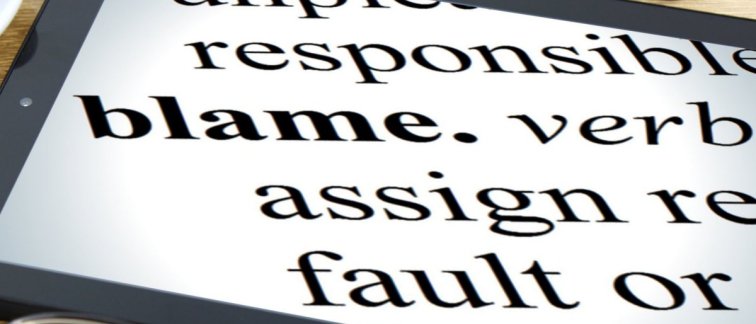By Mandy X. Hu
‘Are my supervisor’s expectations unreasonably high or am I not working hard enough?’
In other words: who is at fault? I’m sure you’ve asked yourself a similar question at many moments during your PhD (and life). During any event where we feel uneasiness, stress, or conflict, we want to point our finger at the one who’s causing it. It’s a universal human tendency. But why do we assign blame? Why do we need to pinpoint who is the culprit in the story?
Blaming others
Because it gives us a sense of protection and control. When we assign the role of the bad guy to someone else – let’s use the quote above and say this is the supervisor – we can protect our self-image with the following narrative: ‘They are the one who is unreasonable, unempathetic and wrong in their behavior, so it’s not my fault that I’m not living up to their expectations. I’m perfectly good at doing my job.’ In other words, we can play the hero in this story. And how does the hero keep control over the narrative? By taking down the bad guy. Not literally of course, but by (mentally) punishing the other and expecting them to remorse and change. We blame others to feel better about ourselves. But the thing is, it doesn’t really make us feel better, does it? Rather, the act of blaming leaves us at the mercy of others. It doesn’t make us the hero – it makes us a victim.
Blaming ourselves
The other narrative is to assign the role of the bad guy to ourselves: ‘They are right, I’m not working hard enough and I’m not making enough progress.’ Now why would we do that? Because, again, it gives us a sense of protection and control. It’s seems counterintuitive: how can blaming ourselves lead to a sense of protection? Well, in some way by already deciding that we’re the bad guy, we think it will hurt less when others say or believe this about us. And how does self-blame lead to a sense of control? We believe that’s how we can bully ourselves towards improvement – or at least away from getting worse. We blame ourselves to push ourselves to become better. But that, too, doesn’t really work, does it? Rather than feeling empowered to improve, bullying ourselves leads to a feeling of powerlessness. Because who is at the receiving end of the bully? That’s right, a victim.
Blaming no one
Let me propose something really crazy: let’s blame no one. There’s no culprit or hero and there’s no controlling the story. There are only imperfect humans who are doing the best they can with the cards they’ve been dealt. How does that sound? Perhaps it makes you feel… uneasy? If blaming gives us a sense of protection and control, what’s left when we stop blaming?
Vulnerability. We blame so we don’t have to feel the fear of not being good enough.
I hear you thinking: that’s it? We just let go of blame and feel vulnerable – and not do anything? For the ones who’ve read my previous blogs, you know what’s coming: the next step is kindness. It starts with being kind to ourselves. When we dare to go beyond the blame and feel our vulnerability and fear – really feel that pain – our natural response is kindness. And having true kindness for ourselves naturally lessens self-blame and blame of others – we have a means to be with our pain without having to mask it with anger and resentment. This creates space to realize that the other is just like us: trying to be the hero in the story – trying to protect and control their narrative. With this in mind, we can ask ourselves the very sincere question: what would be a kind and wise action now? We can set our boundaries or even break off (working) relationships – not from a place of blame but from a place of caring. We can take responsibility – not by bullying ourselves but by encouraging and supporting ourselves. We can talk to each other - not from hero to culprit but from human to human. We can choose kindness over blame.
Do you recognize yourself in this article? The PhD advisors are here for you. Get in touch with us for a consultation (phdadvisor@amsterdamumc.nl).

